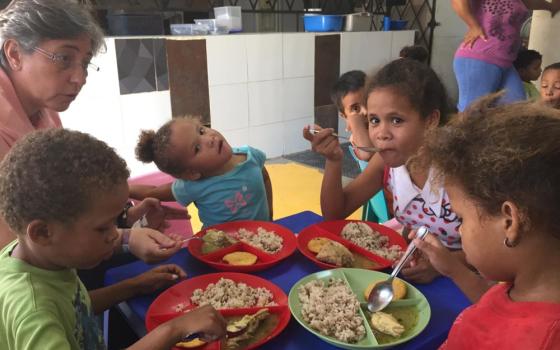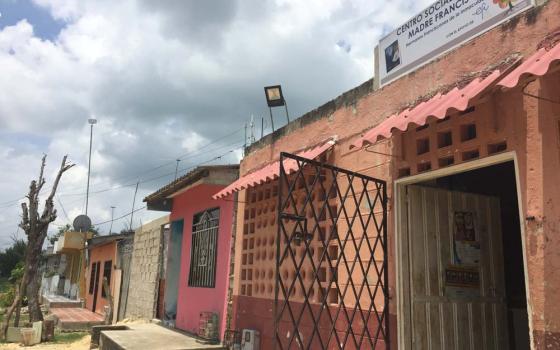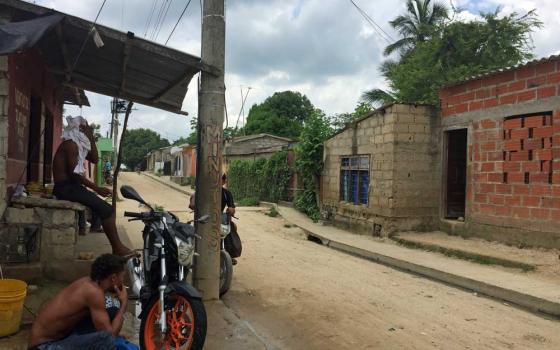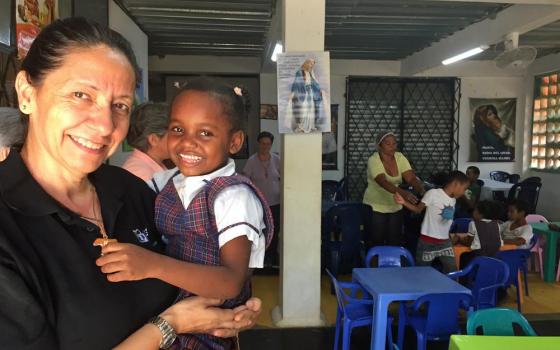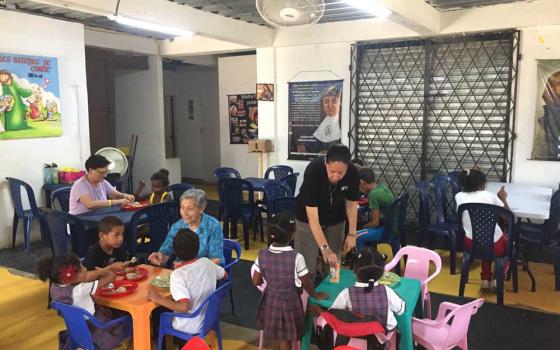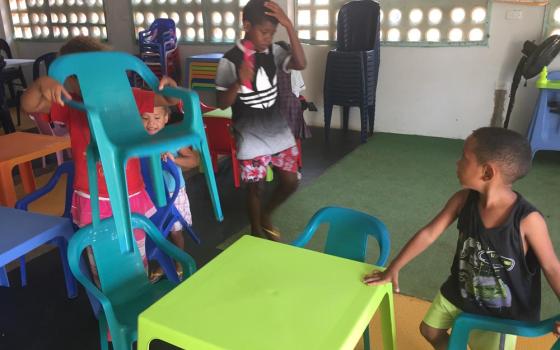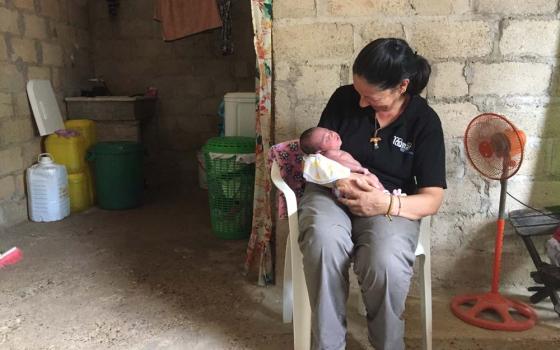The sisters pull up to the modest dining hall in their minivan following an hour-plus drive from Cartagena, Colombia, a port city famous for its white-sand beaches and floral balconies. Their commute takes them from a touristy destination to the slums of Arjona, where their dining hall feeds about 130 impoverished children a day.
The Franciscan Sisters of the Immaculate, a Valencian order out of Spain, feed children from 6 months to 15 years old at Centro Social Pastoral Madre Francisca, a kitchen in the barrio of Limonar. Many of the children there are at risk of joining gangs or falling into prostitution.
"You see them dying of hunger, and yet content and always happy," said Sr. María José Alamar, the kitchen's overseer who is originally from Spain but has lived in Cartagena for nine years.
After Pope Francis' September visit to Cartagena, where he spoke to 800,000 people who attended the papal Mass, the Franciscan Sisters of the Immaculate were inspired by the encouragement for those in Cartagena to take on their problems, to help the less fortunate and address poverty head-on, Alamar said.
The Franciscan Sisters of the Immaculate have a presence in five continents, but just three sisters can be found in Cartagena, traveling to Limonar on a near-daily basis, where they tend to their kitchen, visit the residents, teach catechism on the weekends, and encourage extracurricular activities among adolescents, such as plays the children produce.
In Cartagena, Francis invoked St. Peter Claver, the patron saint of human rights who ministered to Cartagena's African slaves in the early 1600s and became known as "slave of the slaves."
"He had the genius to live the Gospel to the full, to meet those whom others considered merely as waste material," Francis said.
Pope Francis is "up top in the Vatican, and it's us here living the day-to-day who need to take the steps," Alamar said.
Though the town of 50,000 is more evangelical than Catholic, the Franciscan Sisters of the Immaculate distributed tickets to those in Arjona for the papal Mass and helped organize transportation into the city
"Like [Francis] said, it's not just about taking the first step, but about continuing the steps and to do what we can within our limits," Alamar said.
Keeping children off the streets
Alamar and three other sisters revamped the Limonar barrio's dining hall, which is funded by the order's schools in Spain, after buying it from Carmelite sisters in 2012. When Alamar inherited the dining hall, food was cooked over a few stones on the ground, and stray dogs circled as the children ate seated on the ground.
"The contrast is what strikes me," she said. "The cafeterias I'm used to seeing filled with children in our schools in Spain and comparing that to what these children are experiencing ... You don't get used to it."
While three to four Spanish sisters usually visit the kitchen at a time, it often changes depending on who from their Spanish order is visiting Alamar and Sr. Consuelo Vilaplana, who has been doing this ministry in Cartagena for almost two years.
The sisters hired three paid kitchen workers to cook and clean dishes, and the children set up the tables and chairs as they arrive. From the outside, the dining hall is a simple coral building alongside a dirt road, next door to colorful concrete shacks.
Many of the children who scramble into the sisters' dining hall come with empty stomachs, as their last meal was the day before at the same dining hall. They start trickling in at 11:30 a.m., but the early ones shower the sisters with hugs and hand-holding the second they open the car door. Some are in uniforms, either fresh out of school or about to go in, while others wear bright, mismatched outfits. The majority are of African descent.
Often, parents don't send their kids to school so they can sleep later and not be hungry for breakfast, the sisters said. Most fathers drive motorcycle taxis or fix up houses, and mothers either work as maids or take care of their children. Many children have a parent in jail.
Vilaplana said some of the children who come to the dining hall are already dealing drugs by the time they are 10 or 11 years old, working as mules for older kids who give them the drugs to sell. That's how gangs form early, Alamar added: In the past three to five years, kids between 11 and 16 already have learned how to intimidate, and they start to organize themselves as a gang.
In 2015, El Tiempo, a Colombian newspaper, reported that authorities identified more than 500 street gangs in Colombia. But in Cartagena, gangs were mostly made up of adolescents involved in lighter crime, such as stealing.
When one young boy got kicked out of school for consistently disruptive behavior, the sisters intervened and worked with the administration to readmit him. They continue to defend him to keep him in school despite his disciplinary issues. Outside of school, he's been caught robbing purses and once assisted in robbing a motorcycle.
"If we don't get to him first, if we don't help him change his ways fast, he's capable of becoming the worst of them because he has very bad influences all around him," Alamar said. "So how do you confront him? How do you change his surroundings? Yes, it's up to his family, but maybe we can push him to get into baseball, and for as long as he's playing baseball, he's not on the streets. Or while they're in the theater, they're not on the streets. Right now, there's a youth group that organizes regular dances."
One group of children is even putting on a play that raises awareness of human trafficking, writing, directing and performing in the skit entirely by themselves. The sisters merely encourage them. And on Saturday afternoons, the sisters offer catechesis and Communion classes.
"Maybe we're not directly involved. They're not with us all the time, but we can help them get off the streets in these ways. And while they're in dining hall, they're not on the streets," Vilaplana said.
"You know that this is the reality they live, and you want to change it but have to accept the fact that you can't," she said. "They're the ones who have to learn to help themselves, but it still hurts you to see them struggle and feel powerless."
As for girls who have already roped into prostitution, Alamar said, "What can we do? We can [only] work to prevent the girls from falling into it."
"And the ones who have already fallen into prostitution," Vilaplana said, "you accompany them, you give them hope, and you keep holding their hand, and perhaps they'll escape it. But it's more difficult because the web is much stronger than it appears."
'You can't anticipate what you see'
As lunch wraps up, Vilaplana and Alamar make house visits while the two other sisters — on this September day, María Rosario Andres and Eugenia Temiño, also Franciscan Sisters of the Immaculate — stay back with the remaining children.
Vilaplana and Alamar pass young women playing cards around a small table in the sweltering heat, and the sisters stop to chat about the details of the women's lives: How's your brother? Did you hear back from that job? Is the baby doing better?
Alamar later mentioned that one of those women had three self-induced abortions, the result of her involvement in sex work. Girls tend to start having babies around 15, she said, while others around that age fall into prostitution, firmly in the grip of a pimp.
"They need money and discover this is a quick and easy way to make money, and before they know it, they're trapped," Vilaplana said.
Temiño had been working with Alamar and Vilaplana for about six weeks and was finishing up her "vacation" in Cartagena to head back to Spain.
"It's a beautiful job, seeing them little by little taking in the little that you can give," Temiño said. "You see them become a little more conscious of what's their responsibility and what they have to be grateful for."
She said her previous ministry doing similar work in the slums of Peru, Chile and Honduras prepared her for what she was doing in Cartagena, but having experience didn't totally ease the shock of what she saw in the dining hall.
"You can't anticipate what you see; you just have to see it," she said. "That's our path."
As Alamar and Vilaplana make their rounds from house to house, they display a close bond with each family that they said took a while to cultivate, as each home tends to be reluctant of new faces and inviting outsiders in. They visited all the homes with newborns, taking selfies with their "niece" or "nephew," they joked, urging mothers to name their daughters Francisca after the order.
"The pope was very clear in his message," Alamar said. "So you can say, 'Oh, how wonderful, what the pope said, what a great message.' But you need to act, not just listen."
[Soli Salgado is a staff writer for Global Sisters Report. Her email address is ssalgado@ncronline.org. Follow her on Twitter: @soli_salgado.]
